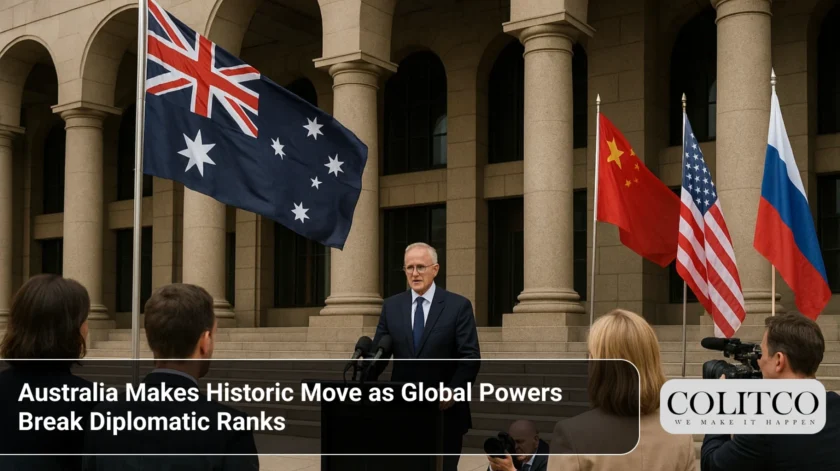Australia officially recognised Palestinian statehood on September 21, 2025, joining a coordinated international effort that signals a dramatic shift in Western diplomatic relations with the Middle East.
Prime Minister Anthony Albanese formalised the recognition alongside the United Kingdom and Canada at the United Nations General Assembly in New York. The move represents Australia’s contribution to international momentum towards a two-state solution, a ceasefire in Gaza and release of the hostages.
The Decision That Divided Parliament
The historic announcement sparked fierce political debate domestically. The Federal Opposition strongly condemned recognising Palestine and called for Labor to reverse its decision, marking a significant division in what has been Australia’s decades-long bipartisan foreign policy on the two-state solution.
My statement formally recognising the State of Palestine. pic.twitter.com/LnmrX29TCV
— Anthony Albanese (@AlboMP) September 21, 2025
Opposition Leader Sussan Ley criticised the timing, arguing the recognition came while hostages remain in Gaza and Hamas controls Palestinian territories.
Conditions and Commitments between Australia and Palestine
Australia’s recognition wasn’t unconditional. The Palestinian Authority provided direct commitments to Australia on reforming its governance, terminating prisoner payments, institute schooling reform, demilitarise and hold general elections.
These commitments include:
- Recognition of Israel’s right to exist
- Demilitarisation of Palestinian territories
- Fresh general elections with no Hamas involvement
- Governance and education reforms
- International oversight against violence incitement
Global Diplomatic Realignment
The coordinated move reflects growing international pressure on Israel. As of September 2025, the State of Palestine is recognized as a sovereign state by 151 of the 193 member states of the United Nations, or just over 78% of all UN members.
France and Belgium are expected to follow suit, potentially isolating the United States further among its traditional allies. The timing coincides with Israel’s escalating military operations in Gaza, where it has killed more than 65,200 Palestinians.
Economic and Trade Implications of Australia’s Recognition of Palestine
The recognition creates potential economic ripple effects. The Strait of Hormuz, a critical chokepoint for 20% of global oil trade, remains a flashpoint. A 30% surge in vessel insurance costs in 2025, as reported by Lloyd’s of London, underscores the financial risks of operating in this region.
Regional investment flows face disruption, with Lebanon’s infrastructure projects now carrying a 40% higher delay risk due to political instability, per the World Bank.
Israeli Prime Minister Benjamin Netanyahu condemned the recognition, vowing “there will be no Palestinian state” and calling it “giving a massive prize to terror”.
English: pic.twitter.com/wbIMUXVm2R
— Suppressed News. (@SuppressedNws1) September 21, 2025
The move risks straining Australia’s relationship with the Trump administration. US Secretary of State Marco Rubio has criticised similar declarations as “largely symbolic” moves that “emboldened Hamas.”
Public Opinion and Protests
The decision followed massive public demonstrations. Millions of Australians have taken to the streets, including 300,000 last weekend in Sydney alone, calling for sanctions and an end to the arms trade with Israel.
However, polling reveals mixed public sentiment. A YouGov poll conducted between 19 and 23 April found that 35% of Australians supported recognising a Palestinian state. 21% opposed recognition while 44% stated that they did not know.
Historical Context
Australia’s position builds on historical precedent. Australia was the first country to raise its hand at the United Nations in support of Resolution 181, to create the State of Israel – and a Palestinian state. More than 77 years later, the world can no longer wait for the implementation of that Resolution to be negotiated between the parties.
Also Read: British Couple Detained by Taliban for Eight Months Return Home After Qatar-Mediated Release
Next Steps and Future Relations
The recognition opens pathways for deeper diplomatic engagement. Australia indicated potential embassy establishment and formal diplomatic relations, pending Palestinian Authority reforms.
Foreign Minister Penny Wong emphasised the urgency, warning earlier that “there is a risk there will be no Palestine left to recognise“.
The recognition marks Australia’s most significant Middle East policy shift in decades, potentially reshaping regional diplomatic relationships and trade partnerships for years to come.
FAQs
Q: How many countries now recognise Palestine?
A: 151 of 193 UN member states now recognise Palestinian statehood, representing over 78% of the international community.
Q: What conditions did Australia set for recognition?
A: Palestinian Authority must recognise Israel’s right to exist, demilitarise, hold elections excluding Hamas, reform governance and education, and accept international oversight.
Q: Will this affect Australia-US relations?
A: The move risks tensions with the Trump administration, which opposes unilateral Palestinian recognition and supports Israel’s position.
Q: What’s the economic impact?
A: Regional instability affects energy markets, with 30% higher vessel insurance costs and increased investment risks in Middle Eastern infrastructure projects.












